A pecan nut allergy is a specific type of tree nut allergy that can cause a range of allergic reactions, from mild symptoms to severe and potentially life-threatening anaphylaxis. This blog article will provide a comprehensive overview of pecan nut allergies, covering key aspects such as causes, symptoms, diagnosis, management, and prevention.

As an Amazon Associate, I may get compensation for purchases.
Table of Contents
Understanding Pecan Allergies
A pecan allergy means your body’s immune system mistakenly identifies the proteins in pecans as harmful. When someone with this allergy eats pecans or foods containing pecan pieces, their immune system becomes overactive and releases histamines, leading to allergic reactions.
Is a pecan allergy a nut allergy?
Yes, pecans are considered tree nuts, and they can cause allergic reactions in individuals who have tree nut allergies. If someone is allergic to tree nuts, they could likely have an allergic reaction to pecans as well.
How common are pecan allergies?
Pecan nut allergies, like other tree nut allergies, are relatively common. Tree nut allergies affect up to 1 out of 100 people in the United States. While specific statistics on pecan nut allergies alone are not typically separated from overall tree nut allergies, pecans are included in the list of common tree nuts that can cause allergic reactions.
Pecan Tree Allergy vs a Pecan Nut Allergy
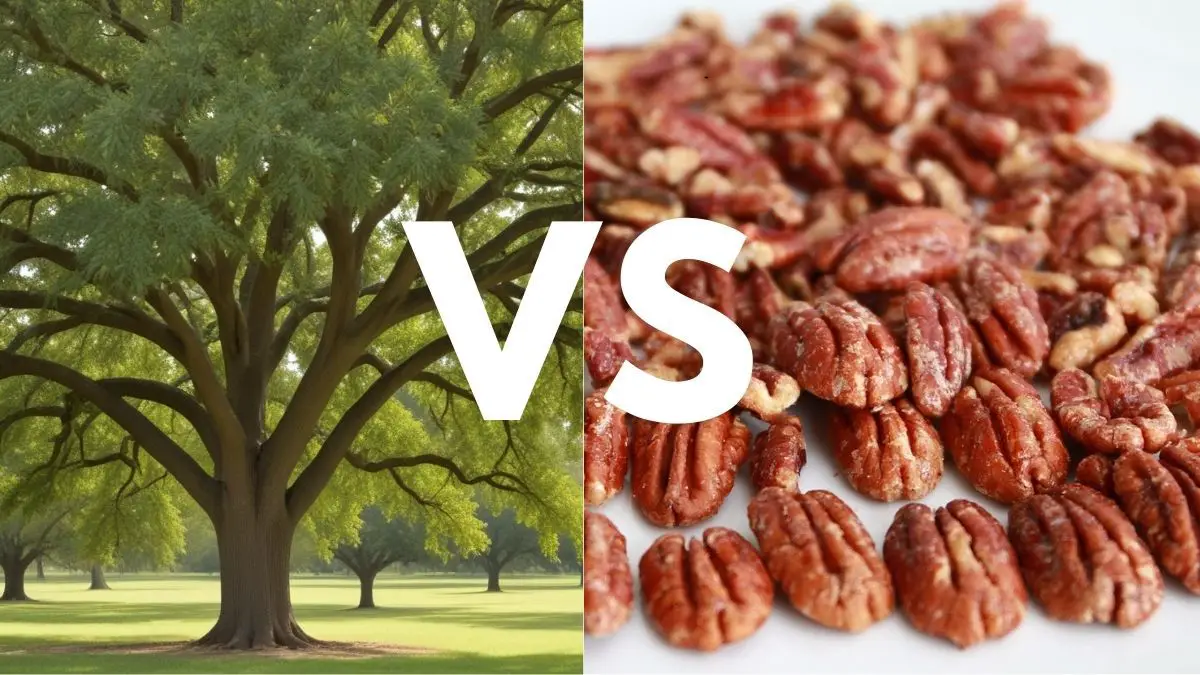
The difference between a pecan tree allergy and a pecan nut allergy lies in the source and nature of the allergen:
Pecan Nut Allergy
A pecan nut allergy has its own distinct characteristics as compared to a pecan tree allergy. Here is a brief overview:
- Source: The proteins found in pecan nuts.
- Symptoms: Can include itching, hives, swelling, gastrointestinal issues, difficulty breathing, and severe reactions like anaphylaxis.
- Management: Involves avoiding pecan nuts and products containing them, and carrying emergency medications such as antihistamines or epinephrine if prescribed.
Pecan Tree Allergy
A pecan tree allergy has its own distinct characteristics as compared to a pecan nut allergy. Here is a brief overview:
- Source: The pollen produced by pecan trees.
- Symptoms: Typically similar to hay fever, including sneezing, runny or stuffy nose, itchy or watery eyes, and sometimes asthma-like symptoms.
- Management: Focuses on reducing exposure to pecan tree pollen during pollination season, and may include using allergy medications such as antihistamines, nasal sprays, or undergoing allergy shots (immunotherapy).
While both allergies involve the immune system reacting to different components of the pecan tree, they are distinct conditions, and having one does not necessarily mean you will have the other.
Can you experience a sudden pecan allergy?
Yes, it is possible to develop a sudden allergy to pecans, or any other food, even if you have previously consumed them without any issues. Allergies can develop at any age and can sometimes appear unexpectedly.
The reasons for developing a new allergy are not entirely understood, but they may include genetic factors, changes in the immune system, or increased exposure to allergens.
Pecan Allergy Causes and Risk Factors
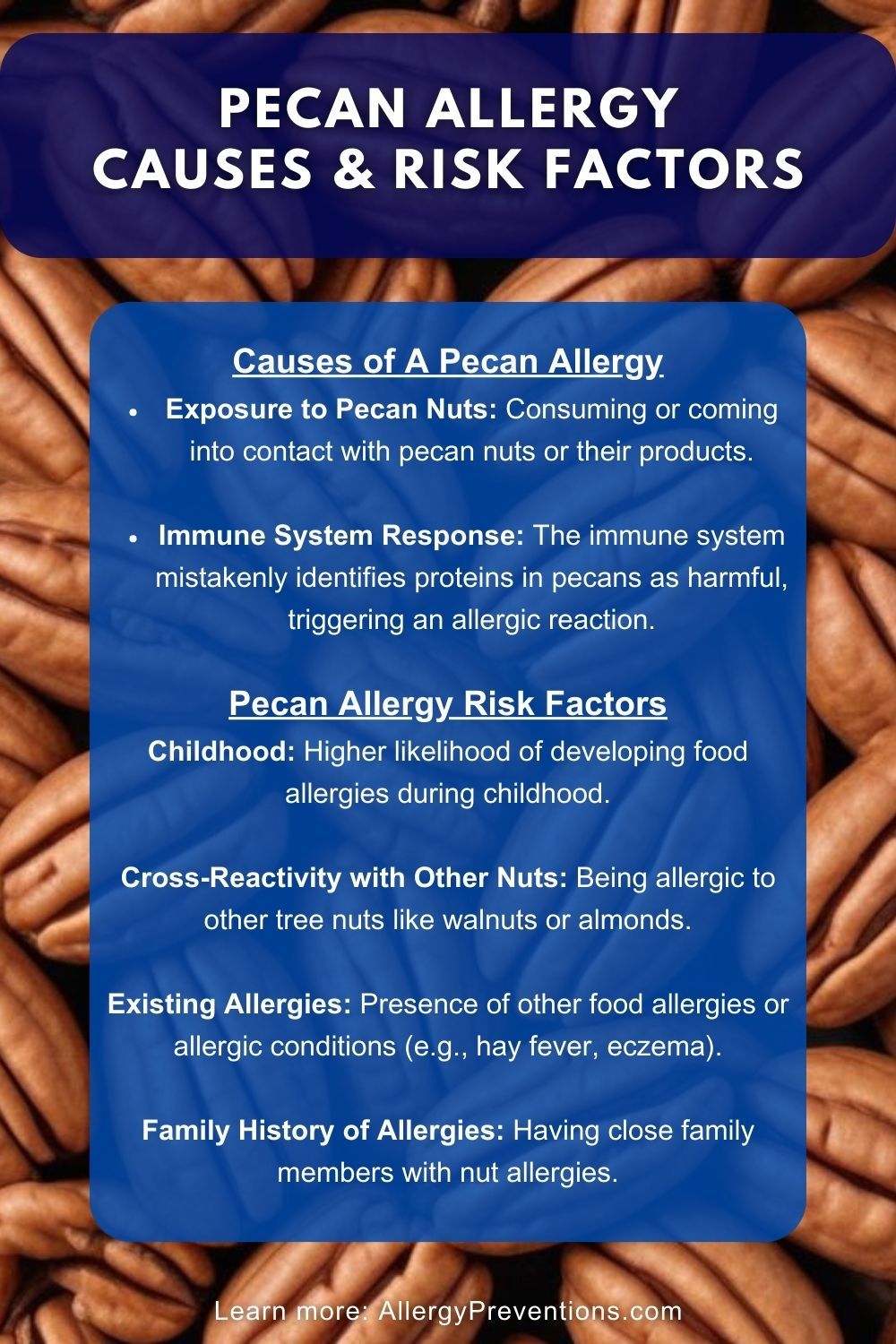
A pecan allergy is caused by exposure to pecan nuts, where the immune system mistakenly identifies pecan proteins as harmful, triggering an allergic reaction. Risk factors include a family history of allergies, existing food allergies, or allergic conditions.
Conditions like hay fever and eczema, a higher likelihood of developing food allergies during childhood, and cross-reactivity with other tree nuts such as walnuts or almonds are also common risk factors.
Causes of A Pecan Allergy
- Exposure to Pecan Nuts: Consuming or coming into contact with pecan nuts or their products.
- Immune System Response: The immune system mistakenly identifies proteins in pecans as harmful, triggering an allergic reaction.
Pecan Allergy Risk Factors
- Childhood: Higher likelihood of developing food allergies during childhood.
- Cross-Reactivity with Other Nuts: Being allergic to other tree nuts like walnuts or almonds.
- Existing Allergies: Other food allergies or allergic conditions (e.g., hay fever, eczema).
- Family History of Allergies: Having close family members with nut allergies.
Symptoms of A Pecan Nut Allergy
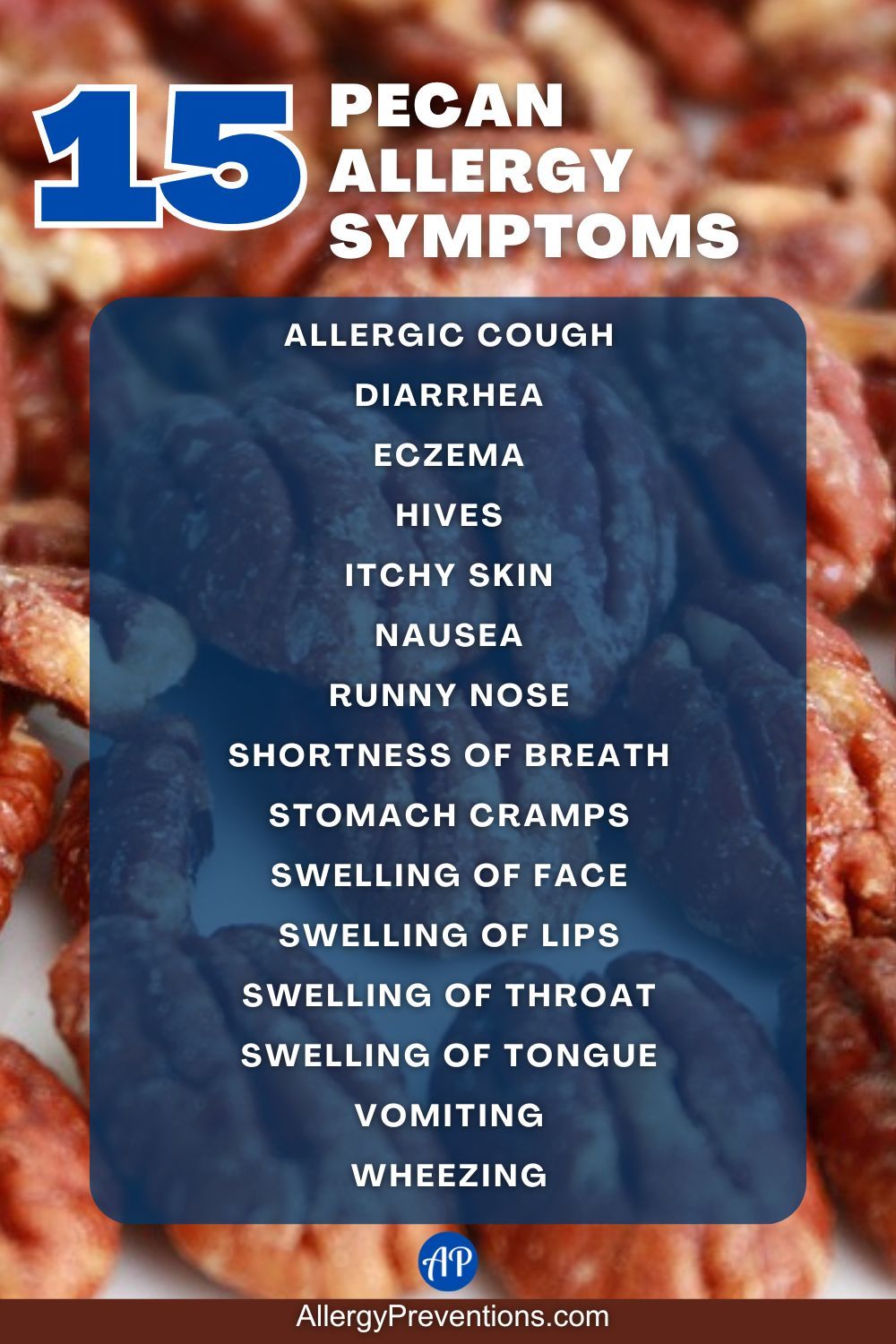
Pecan allergy symptoms can vary in severity from mild to life-threatening, and it’s essential to seek medical attention if you experience any allergic reactions. Here is a list of symptoms symptoms you may encounter with a pecan nut allergy:
- Allergic Cough
- Diarrhea
- Eczema
- Hives
- Itchy skin
- Nausea
- Runny nose
- Shortness of breath
- Stomach cramps
- Swelling of face
- Swelling of lips
- Swelling of throat
- Swelling of tongue
- Vomiting
- Wheezing
How long do pecan allergy symptoms last?

The time pecan nut allergy symptoms last can vary. For some people, they might only last a few hours or a day if the reaction is mild. But if the reaction is severe or leads to anaphylaxis, symptoms could last longer and need medical help.
Usually, symptoms go away once the person stops eating pecans or gets treated with medicine like antihistamines or epinephrine. It’s important to keep an eye on the symptoms and get help if they don’t go away or get worse.
Diagnosing Pecan Nut Allergies

Diagnosing pecan allergies typically involves a combination of medical history, physical examination, and allergy testing. Once you have a diagnosis, you will be able to develop a treatment and management plan for your allergies.
Medical History & Physical Exam
The doctor will ask questions about your symptoms, such as when they occur, how severe they are, and if there are any specific triggers, like eating pecans.
The doctor may conduct a physical examination to look for signs of allergic reactions, such as skin rashes, hives, or respiratory symptoms like wheezing or nasal congestion.
Pecan Allergy Testing
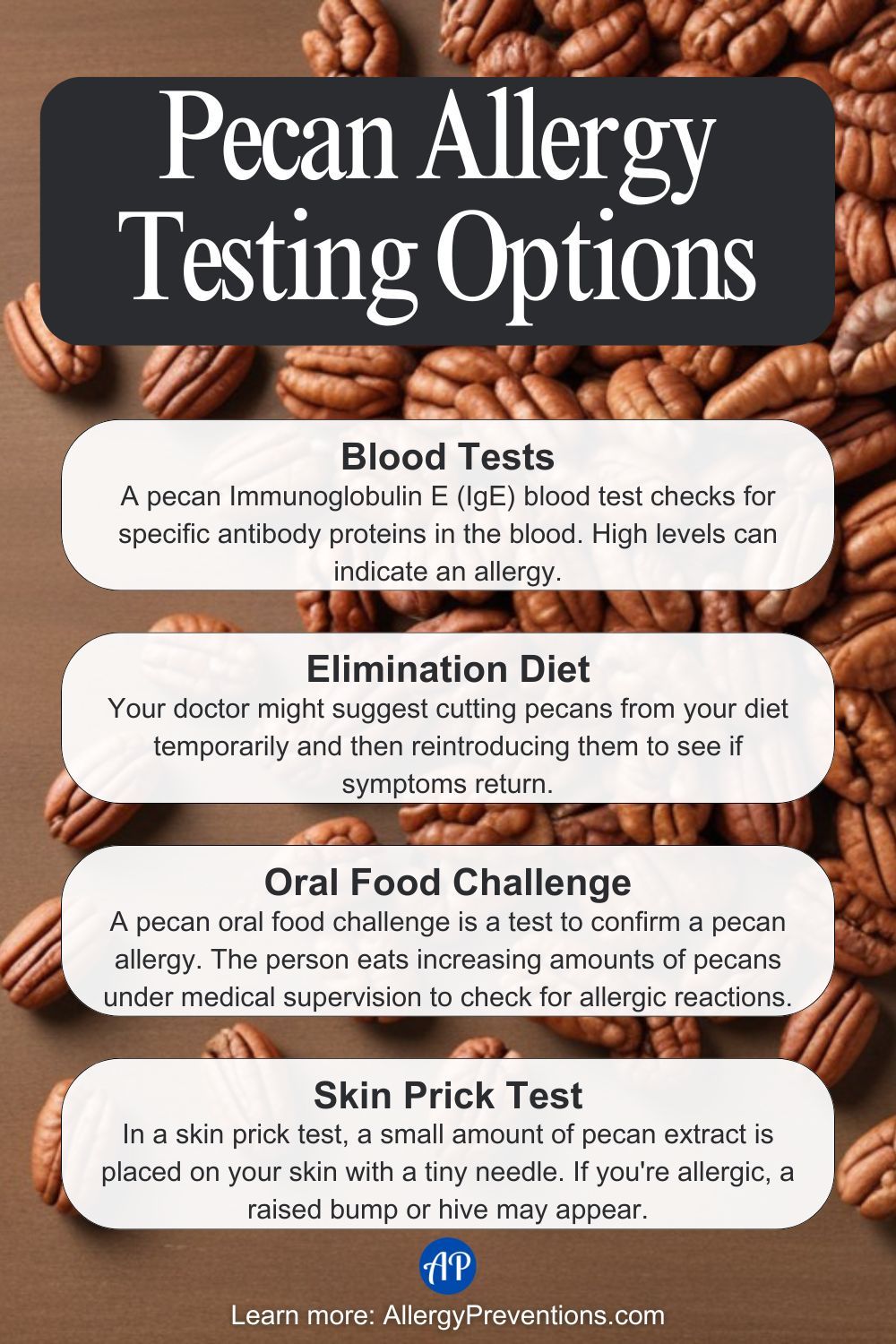
There are a few different types of allergy tests that can be used to diagnose a pecan nut allergy. The tests most commonly performed are the skin prick test, blood tests, oral food challenges, and an elimination diet.
Blood Tests
A pecan Immunoglobulin E (IgE) blood test, tests for specific antibodies proteins in the blood. Elevated levels of these antibodies can indicate an allergy. Like the skin prick test, the blood test typically tests for more than just one allergen.
Elimination Diet
Suppose your doctor suspects a pecan nut allergy but standard tests are inconclusive. In that case, they may recommend eliminating pecans from your diet for a period of time and then reintroducing them to see if symptoms recur.
Once a pecan nut allergy is diagnosed, it’s important to avoid pecans and any foods that may contain them to prevent allergic reactions. Your doctor may also prescribe medications like antihistamines or epinephrine auto-injectors (e.g., EpiPen) for emergency treatment of severe reactions.
Pecan Oral Food Challenge
A pecan oral food challenge is a medical procedure used to diagnose or confirm a pecan nut allergy. During the challenge, the individual consumes gradually increasing amounts of pecans under medical supervision to observe if they develop any allergic reactions.
This process helps healthcare providers determine the presence and severity of a pecan allergy by monitoring the individual’s response closely. The challenge is conducted in a controlled environment, typically in a hospital or clinic, where emergency medical treatment is readily available in case of a severe allergic reaction.
Skin Prick Test
With a skin prick test (SPT), or “scratch test”, a small amount of pecan extract is placed on your skin, and then a tiny needle pricks the skin underneath the extract. If you’re allergic, you may develop a raised bump or hive at the site.
Typically when an SPT is performed the doctor or allergist will test you for multiple allergies like pollen, trees, and grasses. A SPT can give you and your provider a clearer picture of what you may be allergic to, besides just pecans.
Pecan Allergy Treatment and Prevention Options
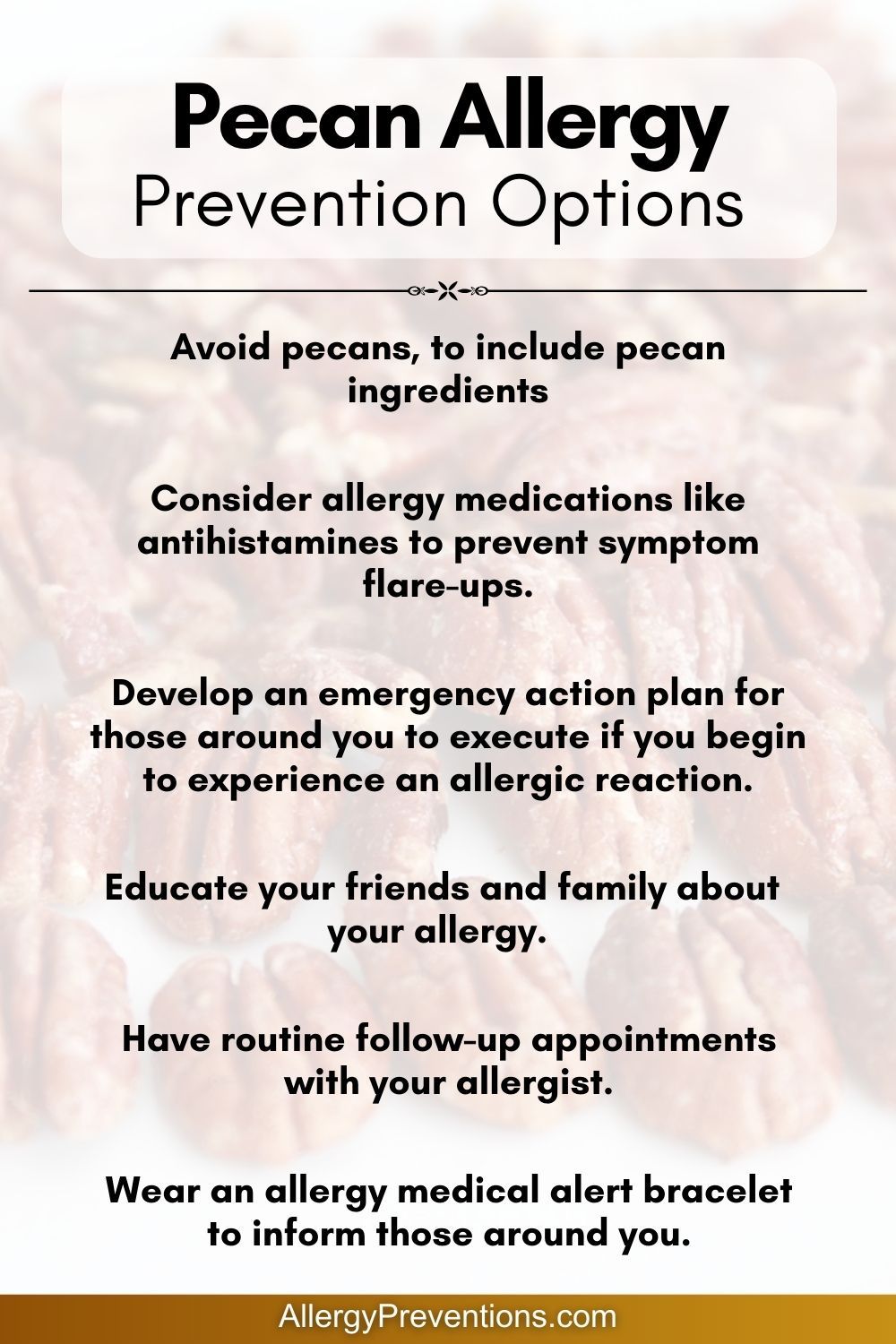
Treating and managing a pecan allergy primarily involves avoiding pecans and being cautious about foods that might contain them. Here are some key steps in managing pecan allergies:
Avoid Pecans
The most effective way to prevent allergic reactions is to avoid pecans and foods that contain them. This means carefully reading food labels, asking about ingredients when dining out, and being aware of cross-contamination in kitchens where pecans may be present.
Consider Medications

Your doctor may prescribe medications to help manage allergic reactions. These may include antihistamines, EpiPens, or steroids. Before starting any medications for pecan allergies, it is advised to talk with your doctor first.
Antihistamines
Antihistamines can help alleviate the symptoms of a pecan allergy by blocking the action of histamine, a compound released by the immune system during an allergic reaction. Histamine is responsible for causing symptoms such as itching, hives, and swelling.
By inhibiting histamine activity, antihistamines can provide relief from these symptoms, making them a valuable tool in managing mild allergic reactions to pecans. Find the best food allergy antihistamine that works for you.
However, it’s important to note that antihistamines are not effective in treating severe allergic reactions, such as anaphylaxis, which require immediate administration of epinephrine and emergency medical attention.
Epinephrine auto-injectors (EpiPen)
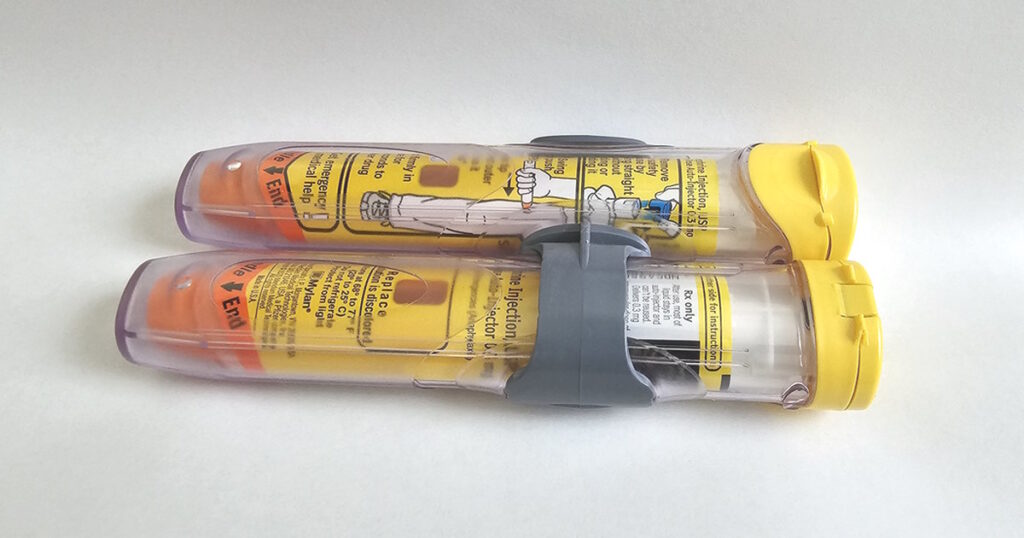
For severe allergic reactions (anaphylaxis), epinephrine is the first-line treatment. If you’re at risk of anaphylaxis, your doctor will likely prescribe an epinephrine auto-injector and teach you how to use it.
Other Pecan Allergy Medications
Depending on your specific symptoms, your doctor may recommend other medications such as corticosteroids to reduce inflammation or bronchodilators to relieve respiratory symptoms.
Develop an Emergency Action Plan
Work with your doctor to develop an emergency action plan outlining what to do in case of an allergic reaction. Make sure family members, caregivers, and school or workplace personnel are familiar with this plan.
Educate Friends and Family
Make sure you and those around you, such as family members, friends, and caregivers, are educated about pecan allergies and know how to recognize and respond to an allergic reaction.
Have Regular Follow-up Appointments
Stay in regular contact with your doctor for monitoring and management of your pecan nut allergy. They can help you adjust your treatment plan as needed and provide guidance on managing potential risks.
Wear A Medical Alert Bracelet
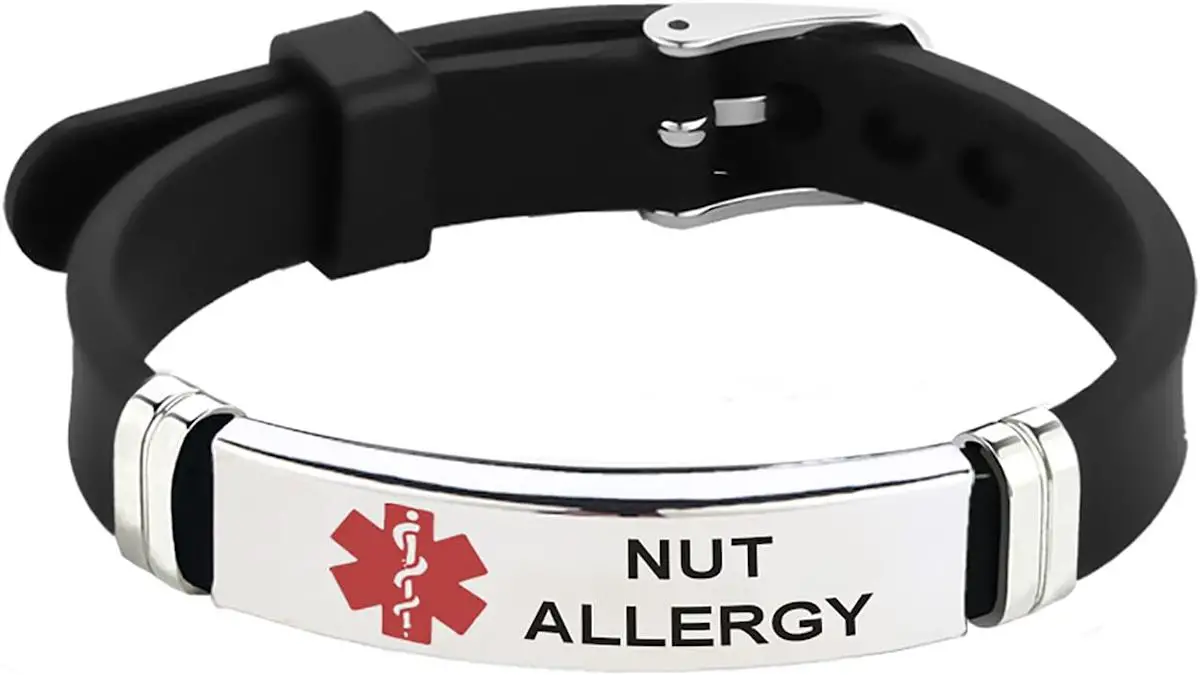
Wearing a medical alert bracelet or necklace that indicates your pecan allergy can be helpful, especially in case of an emergency.
Remember, even with precautions, accidental exposure to pecans can still occur. Being prepared and knowing how to respond promptly in case of an allergic reaction is essential for effectively managing a pecan nut allergy.
Conclusion

Pecan nut allergies can significantly impact individuals’ lives, requiring careful management and vigilance to avoid allergic reactions. While there is currently no cure for this allergy, understanding its causes, symptoms, and management strategies is crucial for those affected.
By educating themselves and others, individuals with pecan nut allergies can navigate their condition with confidence and lead healthy, fulfilling lives while minimizing the risk of allergic reactions.
Check Out These Pecan Allergy-Related Articles Next
Pecan Nut Allergy FAQs
These are the most asked questions as they relate to pecan nut allergies. Please review these questions and let me know if you have any questions that are still unanswered.
Feel free to email me: Chris@allergypreventions.com
Can you be allergic to pecans but not other nuts?
Yes, it is possible to be allergic to pecans but not other nuts. Allergies to specific tree nuts can vary widely among individuals. While some people may be allergic to multiple types of nuts, others may react only to one specific kind, such as pecans.
Can you develop a pecan allergy later in life?
Yes, it is possible to develop a pecan allergy later in life. While food allergies often develop in childhood, they can also appear for the first time in adulthood.
Can you be allergic to pecans but not peanuts?
Yes, you can be allergic to pecans but not to peanuts. Peanuts are legumes, not tree nuts, and the proteins that cause peanut allergies are different from those in tree nuts like pecans. Therefore, it is possible to have an allergy to one and not the other.
What should I do if I suspect I have a pecan nut allergy?
Consult an allergist for proper testing and diagnosis. Avoid consuming pecans and products containing pecans until you receive medical advice.
Can pecan allergies be cured?
There is currently no cure for pecan allergies. The best management strategy is strict avoidance of pecans and being prepared to treat accidental exposures.

